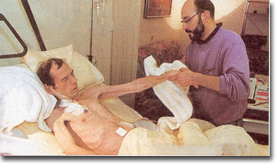Britain: House of Lords debates a bill to allow physicians to assist terminally ill people to die

The debate ranged from spiritual to practical concerns, including Christian theology and the high cost of health care. More than 90 peers were lined up to speak on the issue, including a phalanx of bishops, led by Archbishop of Canterbury Rowan Williams.
"As a caring society we cannot sit back and complacently accept that terminally ill patients suffering unbearably should just continue to suffer for the good of society as a whole," Lord Joel Joffe said in support of the bill. "We must find a solution to the unbearable suffering of patients whose needs cannot be met by palliative care."
Both euthanasia die and assisted suicide are illegal in Britain. The Assisted Dying for the Terminally Ill bill would permit doctors to prescribe drugs that a terminally ill person could take to end his or her own life.
Williams said, however, that while many in the religious community opposed the bill, it was not just for theological reasons.
Along with Cardinal Cormac Murphy-O'Connor, leader of Roman Catholics in England and Wales, and Sir Jonathan Sacks, the chief rabbi of the United Hebrew Congregations of the Commonwealth, Williams published a letter in The Times newspaper Friday urging lawmakers to reject the bill.
The normally staid chamber was charged with emotion, as lawmakers recounted their personal experiences with death.
Baroness Elizabeth Symons recalled a young man she knew fighting cancer more than a decade ago. She said that, though the man was "clear-headed," his will to fight the disease was waning and she believed he would have wanted to die had the law existed allowing physicians to facilitate death.
"Fourteen years later, I'm happy to say he's thriving," she said, her voice breaking, to muted cheers from the peers. "I'm so glad that Lord Joffe's law wasn't on the books then."
The bill has become a focus for renewed debate on euthanasia. A recent survey by the Royal College of Physicians revealed that 73 percent of doctors were against any change in the law to allow physician-assisted suicide or euthanasia. The survey was conducted in the last week of April and the first week of May. No margin of error was given.
A group called Care Not Killing is to deliver a petition to Downing Street, signed by more than 100,000 people, which asks that the law not be changed. Another group, called Dignity in Dying, advocates the change. Deborah Annetts, the group's chief executive, said some people will "still want this option."
Subscribe to Pravda.Ru Telegram channel, Facebook, RSS!




